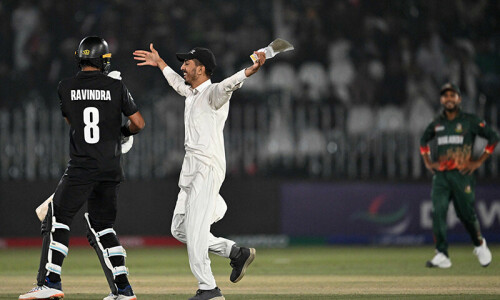THERE are moments when being Pakistani, one feels the nation has made remarkable headway — from technology to travel to nuclear energy. And then there is the vital question of humanity and where we rank on that barometer.
It is the 21st century and Pakistan still reports numerous cases of honour killing annually despite the phenomenon of underreporting. Honour-killing is defined as “gender-based violence … the homicide of a member of a family or social group by other members, due to the belief the victim has brought dishonour upon the family or community”.
Karo-kari falls under the same ambit, literally translating into ‘black male’ (karo) and ‘black female’ (kari). After labelling a ‘dishonourable’ woman ‘kari’, the family aims to restore its honour by killing both the ‘karo’ and ‘kari.’
The concept of women being viewed as property has long existed and the birth of the girl child in many societies continues to be viewed as a blow to the family’s so-called pride. In some societies a man is hit with a shoe seven times if a daughter is born. Interestingly, in many instances the socially constructed concept of ‘honour’ is deployed euphemistically in order to veil the real motive at hand, such as a property feud, inheritance struggle or, in the case of a man, remarriage.
The fire of gender-based violence in Pakistan was further fuelled by the introduction of Zia’s much-debated Hudood Ordinance, which Musharraf later replaced with the Women’s Protection Bill of 2006.
However, the continued lack of attention by public-sector and law-enforcement agencies alike towards demanding accountability of those who commit honour killings has played a big role in perpetuating such incidents, which are at odds with the modern era we inhabit. Human rights and women’s protection has never been a sustained priority for the government. I guess we parted ways with Napoleon’s call to the importance of mothers and women eons ago.
However, not all is lost — select filmmakers and writers have been courageous enough to begin touching upon topics of social importance in Pakistan. At least we are learning to begin the dialogue and to me, that is undoubtedly a silver lining.
Then there are stories of courageous individuals like Khalida Brohi who hails from Balochistan. Despite the oppressive social norms she had to contend with, Khalida was determined to make a difference to people’s lives. In 2004 she joined hands with a group of young people who laid the foundation for Participatory Development Initiatives (PDI) in Khuzdar, Balochistan. The key aim of PDI was to promote participatory and sustainable development, whilst protecting the ecosystem and striking a gender balance — in other words, an equal opportunities endeavour.
Khalida had the foresight to pre-empt the fact that the success of her efforts hinged severely on maximum community participation as well as on the philosophy that financial empowerment would become an enabler for social inclusion.
As a result her initiatives involved interactive entrepreneurial programmes, including cricket tournaments, peer to peer education programmes and public theatre events which had a two-fold aim — creating awareness around issues of significance and promoting critical dialogue amongst decision makers, including tribal leaders. Transformation to Khalida meant direct involvement at the village level rather than just overarching conversation — this resulted in the creation of sustainable Sughar resource centres in a number of tribal areas of Balochistan.
In 2008 Khalida and her programme partners successfully launched a campaign with the aim of reducing the number of honour killing cases and tackling the tribal customs associated with the existence of the jirga system. Khalida’s success culminated in a 400-person march to challenge honour killing and gender-based violence in Pakistan.
On the flip side, what is interesting is that unlike most other efforts, PDI also remains neutral enough to include efforts to preserve and protect the more productive and value-additional nuances of Balochi tribal traditions via skill development and capacity-building programmes, as opposed to a cookie cutter, one-size-fits-all strategy. Such courageous endeavours must be recognised and applauded: Khalida’s agenda and terrain are very challenging, yet her success rate is truly inspirational.
Finally, the prevalence of such traditions in Pakistan can’t help but point towards Warren Buffet’s concept of the inner versus outer scorecard. The inner scorecard is an individual’s own criteria by which one judges him or herself. In contrast, the outer scorecard is the “picture of self-worth predicated upon the judgments of others”. The parallel thus drawn is that between “intrinsic value” vis-à-vis “market-value”. The latter is obviously a subtle form of ego.
As Buffet says, “If the world couldn’t see your results, would you rather be thought of as the world’s greatest investor but in reality have the world’s worst record? Or be thought of as the world’s worst investor when you were actually the best?”
The existence of gender-based violence including karo-kari is a reiteration of the reality that the quest for external reassurance continues in humans unabated. Women must abide by socially restrictive practices to ensure that no damage is done to the family’s honour and thus safeguard the reputation of men. Social approval and outer scorecard at play yet again. Who thinks what and of whom? Alas, they are the superior sex indeed!
The writer is an anthropologist from the University of Oxford.












































